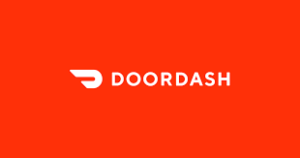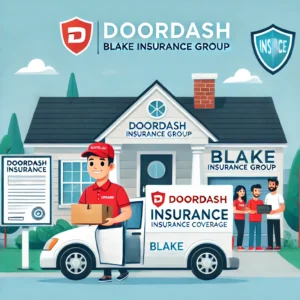Doordash Insurance: Protecting Your Delivery Business

As a food delivery driver, you’re part of a rapidly growing industry that provides convenience and flexibility to millions of customers. However, with the freedom to work on your own schedule comes the responsibility of protecting your business and personal assets.
While Doordash provides basic liability insurance for its drivers, it’s crucial to understand the limitations of this coverage and explore additional options to ensure you’re fully protected on the road.
At Blake Insurance Group, we specialize in helping food delivery drivers like you find the right insurance coverage to meet your unique needs. As independent insurance agents, we work with many insurers to provide you with the most comprehensive and cost-effective solutions available.
Whether you’re a full-time Dasher or looking to supplement your income, we’re here to help you navigate the complexities of Doordash insurance and provide you with the peace of mind you deserve.
In this article, we’ll dive into the details of Doordash’s insurance coverage, explore the limitations of personal auto insurance policies, and introduce you to the various rideshare and delivery insurance options available. By the end of this guide, you’ll have a better understanding of the risks you face as a food delivery driver and the steps you can take to mitigate them. So, let’s get started and ensure that your delivery business is protected every step of the way.
Doordash's Insurance Coverage
 Doordash provides basic liability insurance for its drivers, covering up to $1 million in bodily injury and property damage to third parties during active deliveries. This coverage applies from accepting a delivery request until you complete the drop-off. However, it’s crucial to understand that Doordash’s insurance is secondary to your personal auto insurance policy.
Doordash provides basic liability insurance for its drivers, covering up to $1 million in bodily injury and property damage to third parties during active deliveries. This coverage applies from accepting a delivery request until you complete the drop-off. However, it’s crucial to understand that Doordash’s insurance is secondary to your personal auto insurance policy.
Doordash’s liability coverage protects the company from being sued if you, as a Dasher, are at fault in an accident while making a delivery. It covers the other driver’s vehicle repairs and any medical expenses they may incur. But this coverage has significant limitations:
– It only applies when you have food in your car for an active delivery
– It does not cover any damage to your vehicle or injuries you sustain
– It kicks in only after your personal auto insurance policy has been exhausted
If you’re involved in an accident while waiting for a delivery request or on your way to pick up food, Doordash’s insurance will not provide any coverage. In such cases, your personal auto insurance policy may deny the claim since you used your vehicle for business purposes.
To ensure your total protection, it’s essential to inform your insurance provider that you’re using your vehicle for food delivery. Many insurers now offer rideshare and delivery insurance policies or endorsements that provide coverage during the entire delivery process, including the time between accepting a request and completing the drop-off.
Rideshare insurance coverage typically costs between $6 to $350 per year, depending on the insurer and location. The average monthly cost to add rideshare coverage to a personal auto policy is about $31, which brings the total average monthly cost for a rideshare driver’s car insurance to approximately $199.
Rideshare and Delivery Insurance Options
To address the unique needs of drivers who use their personal vehicles for ridesharing and delivery services, several insurance companies have developed specific policies and endorsements. These insurance options are designed to fill the coverage gaps that standard personal auto policies do not cover, particularly when the vehicle is used for commercial purposes. Here are some of the popular insurance options available:
GEICO’s Hybrid Policy
GEICO offers a hybrid insurance policy that is particularly beneficial for drivers who use their vehicles for personal and business purposes. This policy effectively combines personal auto insurance with commercial insurance elements, providing continuous coverage regardless of whether the car is used for personal trips or business deliveries. This type of policy is ideal for drivers who frequently switch between personal use and ridesharing or delivery tasks.
Progressive’s Rideshare Insurance Add-on
Progressive provides a rideshare insurance add-on, an endorsement to your personal auto policy. This add-on extends your personal auto coverage to include when you are logged into a rideshare app but have not yet accepted a ride request. It provides coverage when you are en route to pick up a passenger until the ride is completed. This add-on is crucial because the rideshare company’s insurance or a standard personal auto policy does not typically cover these periods.
State Farm’s Business Use Designation for Delivery Drivers
State Farm offers a business use designation that can be added to delivery drivers’ personal auto policies. This designation is an endorsement that extends personal auto coverage to include vehicle use for delivery purposes. It’s a cost-effective option for drivers who primarily use their cars to deliver goods rather than passengers. This option ensures that the driver remains covered throughout the delivery process, from when they accept a delivery task until the goods are delivered.
These insurance options are tailored to bridge the insurance gaps that rideshare and delivery drivers face, providing them with peace of mind and protection against potential financial liabilities arising from accidents during commercial use of their vehicles.
Top Delivery Insurance Companies
| Insurance Company | Coverage Options | Special Features | Availability |
|---|---|---|---|
| Progressive | Rideshare insurance add-on, commercial auto insurance | Extends personal auto coverage for delivery tasks | Widely available in many states |
| State Farm | Business use designation, rideshare insurance | Offers coverage for drivers who do deliveries and rideshare without passengers | Widely available, but specific coverage details can vary by state |
| Allstate | Ride for Hire, commercial auto insurance | Provides deductible gap coverage for rideshare drivers | Available in many states, focuses on rideshare but applicable to some delivery scenarios |
| GEICO | Hybrid policy, commercial auto insurance | Covers both personal and business use under one policy | Available in 40 states for rideshare, which can include delivery services |
| Farmers Insurance | Rideshare and Food Delivery coverage, commercial auto insurance | Specific product for app-based delivery and rideshare drivers | Available in many states, with options to add to personal auto policy |
Choosing the Right Coverage for Your Food Delivery Business
When selecting the appropriate insurance coverage for your food delivery business, several key factors must be considered to ensure that you are adequately protected without overspending. Here’s a detailed look at each factor:
State’s Minimum Insurance Requirements
Each state has minimum auto insurance requirements for drivers who want to operate a vehicle legally. These typically include liability coverage for bodily injury and property damage. However, if you’re using your vehicle for food delivery, these minimums may not provide sufficient protection, especially considering the increased risks associated with commercial use. It’s crucial to understand your state’s specific requirements and ensure that your policy meets or exceeds these standards to avoid legal issues and potential financial losses in case of an accident.
Type of Vehicle Used for Deliveries
The vehicle you use for deliveries can significantly impact the type and cost of insurance required. For instance, larger vehicles or those with modifications may require additional coverage. Insurance providers often consider the vehicle type when assessing risk and determining premiums. Suppose you use a newer or more expensive vehicle. In that case, you might also want to consider collision and comprehensive coverage to protect against damage to your vehicle, not just third-party claims.
Driving Record and Claims History
Your driving record and claims history are critical factors that insurance companies consider when determining your insurance rates. A clean driving record without accidents or major traffic violations can lower premiums, while a history of accidents or violations can significantly increase your costs. Maintaining a good driving record is important to keep your insurance rates as low as possible. If you have infractions on your record, some insurers may offer options to improve your rates over time if you remain accident-free and avoid further violations.
Budget and Risk Tolerance
Your budget and risk tolerance are personal factors that will significantly influence the type and amount of coverage you choose. Suppose you are risk-averse and want to ensure you are covered against all potential liabilities. In that case, you might opt for higher coverage limits and additional policies like uninsured motorist coverage or personal injury protection. However, these choices come with higher premiums. Conversely, if you have a limited budget, you might choose higher deductibles to lower your monthly premiums, though this means you’ll pay more out-of-pocket if you file a claim. Balancing your financial capability with the level of risk you are willing to take is crucial in choosing the right insurance policy.
How Blake Insurance Group Can Help Food Delivery Drivers
As an independent insurance agency, Blake Insurance Group is well-equipped to assist food delivery drivers in finding the right insurance coverage to protect themselves and their vehicles while on the job. Here’s how we can help:
Evaluating Existing Personal Auto Insurance Policies
Many personal auto insurance policies do not provide coverage for commercial vehicle use, such as food delivery. We can review your existing policy to determine if you have any gaps in coverage and advise you on the necessary steps to ensure you are properly protected.
Recommending Additional Coverage Options
If your personal auto insurance policy does not cover food delivery, we can recommend additional coverage options to fill the gap. This may include:
– Rideshare insurance add-ons or endorsements
– Commercial auto insurance policies
– Hybrid policies that cover both personal and business use
We work with various insurance providers, including Progressive, Nationwide, and Farmers Insurance, to find the best coverage options for our clients.
Ensuring Proper Protection for Food Delivery Drivers
As food delivery becomes increasingly popular, drivers must have the right insurance coverage in place. Without proper protection, you could face significant financial risks in an accident, including out-of-pocket expenses for vehicle repairs, medical bills, and liability costs.
At Blake Insurance Group, we are committed to helping food delivery drivers navigate the complexities of insurance and find the coverage they need to operate safely and with peace of mind. Our knowledgeable agents can provide expert guidance and advice to help you make informed decisions about your insurance coverage.
If you are a food delivery driver or are considering becoming one, contact Blake Insurance Group today to learn how we can help protect your business and personal assets.

Blake Nwosu
Owner & Principal Agent
Expertise: All personal and commercial line insurance, including auto, home, business, health, and life insurance.
License: 16117464
Blake Insurance Group
Phone: (888) 387-3687
Email: [email protected]
Hours: Mon-Fri 9:00 am to 5:00 pm
Sat-Sun: Closed
